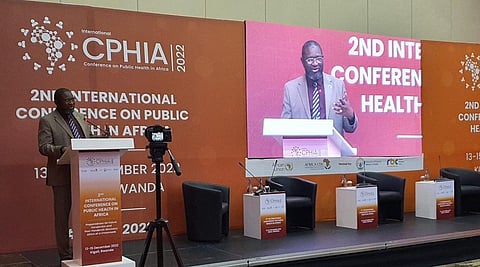

Health experts gathered at the second International Conference on Public Health in Africa (CPHIA 2022) expressed the need for result-oriented research to inform health needs and responses better.
Over 4,000 researchers, policymakers and stakeholders from all the 55 member states of the African Union attended the conference held in the Rwandan capital Kigali.
The conference focused on engaging in science, research, technology and public health policy to strengthen scientific collaboration and innovation across the continent.
Areas of discussion will include problem-solving research findings and education, said Agnes Binagwaho, the co-chair of CPHIA 2022 and retired vice-chancellor of the University of Global Health Equity.
She said:
Africa has understood that we need to go for research that matter to us, not research that somebody in New York, Paris, or elsewhere who is interested in Africa. That’s the first thing we are going to discuss here.
“Second, this will impact the way we educate. It’s a new paradigm to say we should list what we need and make sure that the students that we educate can once as professionals solve it," she added.
Dr Yvan Butera, state minister in the ministry of health, considers this conference a platform for knowledge and skills sharing to build resilient health systems.
“Our health institutions shouldn’t be shaken in the face of outbreaks but must have the capacity to effectively mitigate or respond to them,” he added.
There are 109 different public health events in the continent — diseases identified within the community that have the potential to spread — even if the vast majority of them do not make it to the news, said Dr Ahmed Ogwell Ouma, acting director of Africa Centres for Disease Control and Prevention.
“The public health events of concern today are about 21 out of the 109 across the continent. The problem is not the circulation of the virus, path, parasite, or bacteria. It is all about how we respond to an outbreak,” he said.
What is needed is building capacity to respond within the first 48 hours, he said. During an outbreak, the same health worker is repurposed for emergency tasks, impacting routine healthcare services.
“We are training a volunteer standby force of health workers who we can move from health service to emergency work without affecting the routine health services,” he assured.
There is a need to harness the Africa’s capabilities, including experts and institutions, as well as the public and private sectors. The most urgent needs right now are largely around health emergencies and disease threats, he said.
“When we harness capabilities and gear up towards controlling outbreaks and disease threats, we can settle down on doing the more routine work of strengthening our health systems, training our experts and keeping them here on the continent,” he said.
Africa’s institutions must be strengthened at a country level to respond quickly to an outbreak.
Africa should build confidence and propose implementable solutions that will get the continent closer to achieving the new public health order, experts argued.
It calls for continental collaboration to bolster African manufacturing capacity for vaccines, diagnostics and therapeutics; strengthening public health institutions for people-centred care; expanding the public health workforce; establishing respectful, action-oriented partnerships; and engaging with the private sector.
The second International Conference on Public Health in Africa, going on from December 13-5, 2022, is the first in-person. The first edition of the conference, held from 14-16 December 2021, was entirely virtual.